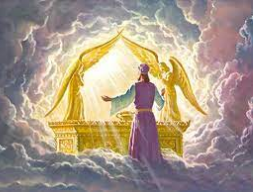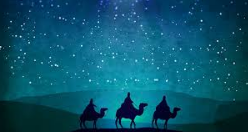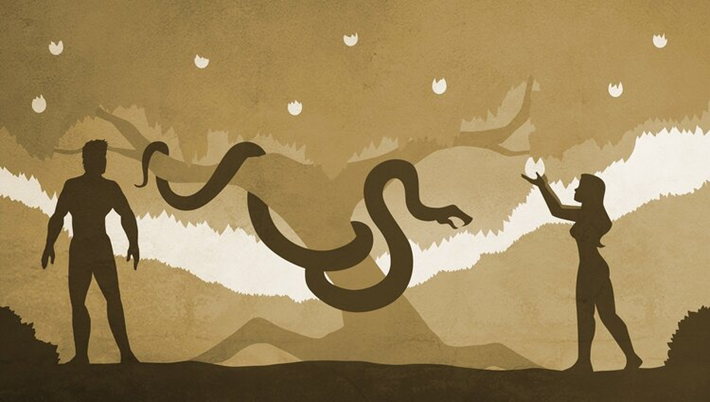01.07.25 - Prophet Anna, the Epiphany, Magi, & John the Baptist
- tmaley
- Jan 9
- 13 min read
Updated: Feb 17
Opening Prayer Epiphany Prayer
Lord and Giver of all good things, the Magi travelled for many miles
to bring the Christ child his first Christmas presents from the gentile nations.
So may we, too, remember with thankful hearts what God has done for us,
and present our hearts before the Christ child to open.
And as you taught us to pray together…
Our Father who art in heaven, hallowed be your name.
Your kingdom come, your will be done, on earth as it is in heaven.
Give us this day our daily bread,
And forgive us our trespasses as we forgive those who have trespassed against us.
And lead us not into temptation, but deliver us from evil.
For thine is the Kingdom, the Power, and the Glory forever and ever. Amen
Where did this last phrase come from?
This last phrase is not in the Bible. It is from the “Didache,” a catholic document that tradition says the Apostles wrote in the 1st century. (pronounced “Did-uh-kay”)
Upcoming major holy days: Christmas season runs from Christmas to the Baptism of Jesus (this Sunday, 1/12).
Quote of the Week:
“It’s not happy people who are grateful. It is grateful people who are happy.” – Francis Bacon
Today’s Theme – Finding our place in God’s Story…
Gospel Reading for 12/30: The Prophetess Anna – Luke 2:36-40
Gospel Reading for 1/5: Epiphany of the Lord – Matthew 2:1-12
Gospel Reading for 1/12: Baptism of the Lord – Luke 3:15-16,21-22

Gospel Overview: Finding our place in God’s Story.
Bishop Baron once suggested that we think of life as a drama – a play that we are in – and it is the story of our life unfolding. There are two possible creators of this play: us or God. The first (us) is the self-drama or ego-drama. The second creator is God – the God-drama or theo-drama. The power of freewill is that we get to write our own script, or we can find our role in God’s script and jump into that role.
Since the fall of man, the tendency of our freewill is to be the center of everything, which leads to the self/ego-drama. It is the play that I’m writing, I’m producing, I’m directing, and I’m starring in. The Fall of Man was a long time ago, yet we still see this everywhere in our culture today, even though Jesus came to provide a path out of the Self 2000 years ago. “Freedom of choice” reigns supreme: I become the person that I choose to be, and everyone else needs to get in line. However, since humans never created a thing, and since from this unbelieving perspective we are just accidental products of our environment, it is a very short story with an insignificant ending.
The God/theo-drama is the great story being told by God; the great play being directed by God. As the Creator of the universe, it is not a small story – and it is the only real story. Yet this Creator of the universe has more humility than any of the self-important ego-dramas that ever lived. If we choose to participate in the Theo-drama, the path is humility but the sky is the limit.
What makes life truly exciting is to discover our role in God’s drama and then enter into our dance with God. He is as much a part of our story as we are. This is what has happened to all of the characters in our readings today.
We could start with Mary and Elizabeth, who in last week’s readings discovered their own climactic roles in God’s story, to put it mildly! God selects this unknown, poor, nobody-maiden to enter into this world. How’s that for a role in the story?
Mary was both religious (devout, pious, observed all the rites) and spiritual (relationship with God), and she was ready. She agreed to her role that God had predestined for her for all time. For freewill beings, predestined is only part of the dance. We must be willing to dance, too. Never do we relinquish freewill. God wishes to enter our lives because we are called to be completely unique expressions of “Self-infused-with-God.”
We know through hindsight that Mary’s role would be a tough one because she is poor, she will have obstacles and challenges, and she will have to watch her son die. But she also knows she will be part of a much bigger story that involves Jesus’ resurrection and the salvation of mankind.
What about Joseph? The model of piety, hard work, and deep, deep faith, the man doesn’t open his mouth once in the New Testament. What a role he agreed to, and what a role model he is. If I ever feel like I’m talking to much, I channel my inner Joseph! If I occasionally don’t care to engage in the drudgery of daily work, I channel Joseph. “Joseph, where are you? I need your intervention!”
What about Elizabeth’s role. She had been praying for a child for probably 50-60 years, and she ends up bearing the spirit of Elijah – John the Baptist – to fulfill the OT prophesies and introduce the Messiah to the world. Not bad!
If you don’t think you have a role in God’s story, you aren’t fully Christian yet. It’s part of what’s meant when Jesus said that faith makes us “fully alive.”
Today, we will talk about the Prophetess Anna, the Magi, and John the Baptist. Since there are multiple stories to catch us up from being off the last couple of weeks, keep in mind the roles they recognized and agreed to take. They were not roles in the “Self-drama,” they were roles in God’s drama because they agreed to dance.

Gospel Reading #1 – The Prophetess Anna

Context: In today’s Gospel, we encounter Anna, a prophetess who lived a life of devotion and hope. Widowed after just seven years of marriage, she spent the remainder of her life—decades—serving God in the Temple with prayer and fasting. Her story is one of quiet faithfulness and committed expectation. I would imagine that the priests and regular Temple visitors probably took this poor old woman for granted for many years.
When Mary and Joseph bring the child Jesus to the Temple, Anna must have received a bolt of lightning from the HS as she recognizes Jesus as the fulfillment of God’s promise. She doesn’t hesitate; her heart overflows with gratitude, and she speaks of the child to all who await the redemption of Israel. Think of the role Anna chose to take in God’s drama. She agreed, for however long it took, to be there so she could participate in announcing the arrival of the Lord.
Luke 2:36-40
There was a prophetess, Anna, the daughter of Phanuel, of the tribe of Asher. She was advanced in years, having lived seven years with her husband after her marriage, and then as a widow until she was eighty-four. She never left the temple, but worshiped night and day with fasting and prayer.
And coming forward at that very time, she gave thanks to God and spoke about the child to all who were awaiting the redemption of Jerusalem.
When they had fulfilled all the prescriptions of the law of the Lord, they returned to Galilee, to their own town of Nazareth.
Why is the presentation important?
Because Jesus was the “firstborn,” and all firstborn of the Israelites belonged to God since the time of Exodus (Ex 13:11-15). It was sign of their covenant relationship.
Jesus’ presentation at the Temple was a really big deal besides just fulfilling this firstborn obligation. What was it?
About 600 years earlier, just before Babylon conquered Jerusalem and destroyed the Temple, the prophet Ezekiel was a priest of the Temple who had been prophesying the fall of Jerusalem if they didn’t change their ways. Finally, God had had enough and in Ezekiel chapter 10-11, he witnesses the departure of God’s presence from the Temple once and for all. It is a devastating event. The only consolation is that God tells Ezekiel that He will return in the future when He “will give them a new spirit … so they can be His people again” – Ez 11:19-20.
Seventy years later after the Babylonian Exile, a remnant of Jews returned and rebuilt Jerusalem and the Temple. It is a shadow of its former glory but, in any event, they do not act like God’s people. God does NOT return to the Temple. From that point on – for the next 400 years – God’s presence is NOT in the Temple until… when?
Jesus’ presentation in the Temple!
The presentation of Jesus in the temple, perfected on the cross, is re-presented every time the Mass is celebrated. At the Offertory each Mass, we now “present” to God ourselves, our lives, and our work, joined to Jesus’ offering in the bread and wine. This “Presentation” goes on now in our churches and in our temples (within us).

Gospel reading #2 – The Epiphany of the Lord, Matthew 2:1-12

Matthew 2:1-12
When Jesus was born in Bethlehem of Judea, in the days of King Herod, behold, magi from the east arrived in Jerusalem, saying, “Where is the newborn king of the Jews? We saw his star at its rising and have come to do him homage.”
When King Herod heard this, he was greatly troubled, and all Jerusalem with him. Assembling all the chief priests and the scribes of the people, he inquired of them where the Christ was to be born.
They said to him, “In Bethlehem of Judea, for thus it has been written through the prophet: And you, Bethlehem, land of Judah, are by no means least among the rulers of Judah; since from you shall come a ruler, who is to shepherd my people Israel.”
Then Herod called the magi secretly and ascertained from them the time of the star’s appearance. He sent them to Bethlehem and said, “Go and search diligently for the child. When you have found him, bring me word, that I too may go and do him homage.”
After their audience with the king they set out. And behold, the star that they had seen at its rising preceded them, until it came and stopped over the place where the child was. They were overjoyed at seeing the star, and on entering the house they saw the child with Mary his mother.
They prostrated themselves and did him homage. Then they opened their treasures and offered him gifts of gold, frankincense, and myrrh.
And having been warned in a dream not to return to Herod, they departed for their country by another way.
3 Reflections
The Epiphany is about God coming for all humans. Although we tend to consider the Magi story as the central one, what other events are considered in the category of Epiphany?
Shepherds – He came not for the rich, famous, and self-important, he came for all humans.
Magi – He came not just for the Jews, but for all mankind.
Baptism – The profound revelation of who Jesus is made by God himself in the presence of the Holy Trinity.
Cana – His first public miracle identifies him as not just another prophet. The changing of water into wine not only signifies his transformative power, it shows his concern for human joy and well-being.
We might ask why were the Magi so determined to find the newborn Savior? At the same time, we might ask why was Herod and the Temple priests so unwilling to find the Savior?
This is perfect example of God’s story: the Magi had found her role in the God’s drama and they can’t help but pursue it and share their discovery and joy wherever they went. Indeed, they are shocked upon reaching Jerusalem that King Herod and Temple priests do not recognize their role in what is happening, even though they help locate the destination. It is shocking because this is more the Jew’s story than the Magi’s story! But the Magi found their role in the Theo-drama and nothing was going to take it from them. Meanwhile, Herod and the others stick to their own Self-drama.
As they left Jerusalem… When they saw the star, they were overjoyed. –Matthew 2:10

Exegesis – remember that a proper reading and interpretation of the Bible involves not only a literal consideration, but also the allegorical and spiritual. Let’s review:
Literal – think if the Magi’s decision, journey, obstacles, destination, and afterwards. It’s like a movie adventure, the most amazing part is they are gentiles. Think of the joy of knowing you are part of something great, but also think of the commitment that it requires.
Allegorical – the gifts.
Gold – Jesus’ kingly role
Frankincense – Jesus’ priestly role
Myrrh – Jesus’ sacrificial role
Spiritual – the story of the Magi is a summary of the dynamics of spiritual life. What spiritual messages can we decipher?
Watching the night sky with scrupulous attention for signs of God’s purpose, the Magi evoke the importance of being alert to the spiritual order. We must keep our eyes open to see what God is up to.
Once they saw the star, they moved, despite the length of the journey. Sometimes people know what God wants them to do, but they don’t act, either out of fear, laziness, or the influence of bad habits. The Magi teach us to move.
When they spoke to Herod of the birth of a new King, he tried to use them to destroy the baby. When you walk the path that God has laid out for you, expect opposition.
The wise men came to Bethlehem and gave the child their precious gifts. When you come to Christ, break open the very best of yourself and make it a gift for him.
Finally, they returned to their home country by another route. As Fulton Sheen commented so magnificently: of course they did; for no one comes to Christ and goes back the same way he came

Gospel Reading #3 – The Baptism of Jesus, Luke 3:15-16, 21-22
Context: This Sunday’s reading is about John the Baptist and the Baptism of Jesus. I’ve broken them into two conversations.
Luke 3:15-16 – John the Baptist
The people were filled with expectation, and all were asking in their hearts whether John might be the Christ.
John answered them all, saying, “I am baptizing you with water, but one mightier than I is coming.
I am not worthy to loosen the thongs of his sandals.
He will baptize you with the Holy Spirit and fire.”

Since the peak of summer, the days have been growing shorter. Night comes sooner. Some parts of the country have lost up to six hours of daylight by this time. The winter solstice is a big event in that it marks the beginning of longer days. Every year, it takes place right around Christmas. The winter solstice, then, isn’t just a matter of astronomy. It’s spiritually illuminating (no pun intended).
This timing is significant.
John the Baptist's birthday is on June 24, which happens to be very close to the summer solstice, when is when the days begin to shorten. After John’s birthday, daylight shortens until Christmas comes, Christ’s birthday, and the days lengthen again. Think about how this compares to what John says about Jesus: "He must increase, while I must decrease."
Thus, in every way, John prepares the world for the coming of Christ – of Jesus’ light entering the world after the Nativity. Jesus enters the world at the darkest time of year, which is always the state of the world before salvation.
What was the spiritual climate at the time of John the Baptist?
In John’s time, the spiritual state of people was filled with disillusionment towards both political and religious authorities, including the priests and the Pharisees. Many religious leaders had become more focused on the external observances of the Law rather than on genuine repentance and a relationship with God, which is evident in the criticisms Jesus made against the Pharisees and the religious elite, whom He described as "hypocrites" (Matthew 23:13). The people's yearning for authentic spiritual renewal and forgiveness contributed to their attraction to John the Baptist, who’s authentic call to repentance and relationship with God resonated with the people.
Why wasn’t John in the Temple like his father, Zachariah, had been? That was the tradition of the Levite tribe.
For John to be in the desert – a place of purification – would be an act of rebellion against the priests of the Temple! This is another connection to John having the “spirit of Elijah,” since some Jewish traditions hold that Elijah left his priestly role to preach against the king and priests. Both John and Elijah lived in the desert with austerity and preached with great passion.
What was unusual about John’s approach to preaching?
Most preachers throughout history – particularly false prophets – make themselves the center of attention. This leads to cults. John drew no attention to himself. Rather, he presented himself as a forerunner, preparing the way of the Lord:
“I baptize with water. He will baptize you with fire and the Holy Spirit.”
“I am not fit to tie the sandals of his feet.”
“He must increase. I must decrease.”
Total humility. And then how powerful it must have been when, upon seeing Jesus approaching for the first time, he said, “Behold the Lamb of God.” No first-century Israelite would have missed the meaning of that: behold the one who has come to be sacrificed. Behold the sacrifice which will sum up, complete, and perfect the temple.
So you see, John is doing his priestly Temple duties after all. He left the superficial words and sacrifices behind, and went to the desert to pave the way for the perfect, loving sacrifice. Behold the lamb for sacrifice, no longer of men, but of God.
It seems John was a little surprised when Jesus showed up. Didn’t John and Jesus grow up together?
There is no indication they grew up together. Remember, they lived nearly 100 miles apart. Also, Elizabeth and Zechariah were very old and were likely not around to have raised John. He may have been raised at the Temple or by the Essenes, who were known to accept gifted young Jews into their community at Qumran, especially if they were orphans.
Another connection to the Essenes is that John used similar style of language to that found in the Dead Sea Scrolls (from Qumran).
Another connection was that certain members of the Essene community refrained from eating food that wasn’t found naturally in the wild, which is the same diet John was on (i.e., locusts/wild honey) reported in the Gospels (Mk 3:4, Mt 3:4).
Another connection to the Essenes is that the “Upper Room” in Jerusalem was located in the Essene Quarter of Jerusalem.
Who were the Essenes?
The Essences were a group of priests who left Jerusalem around 250 BC because they believed the ruling Maccabees broke the requirement for priests and established their own priesthood connected to the ruling family. The resettled on the NW corner of the Dead Sea and created a community that later became known as the Essenes. They considered themselves the true line of priests of the Temple. In Qumran, they went about the work of preparing for the arrival of the Messiah(s).
Luke 3:21-22 Jesus is Baptized
After all the people had been baptized and Jesus also had been baptized and was praying, heaven was opened and the Holy Spirit descended upon him in bodily form like a dove.
And a voice came from heaven, “You are my beloved Son; with you I am well pleased.”

As I had mentioned earlier, different events in Scripture that fall under the heading of Epiphany. This Epiphany event confirms Jesus’ identity, as spoken by God himself, in the presence of the entire Trinity.
Closing Prayer
Prayer of St. Francis
Lord, make me an instrument of your peace:
where there is hatred, let me sow love;
where there is injury, pardon;
where there is doubt, faith;
where there is despair, hope;
where there is darkness, light;
where there is sadness, joy.
O divine Master, grant that I may not so much seek
to be consoled as to console,
to be understood as to understand,
to be loved as to love.
For it is in giving that we receive,
it is in pardoning that we are pardoned,
and it is in dying that we are born to eternal life.
Amen.


Comments